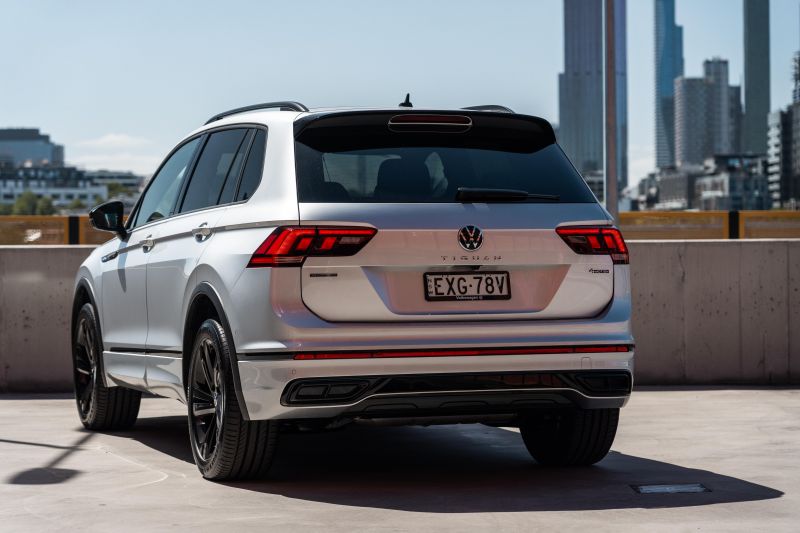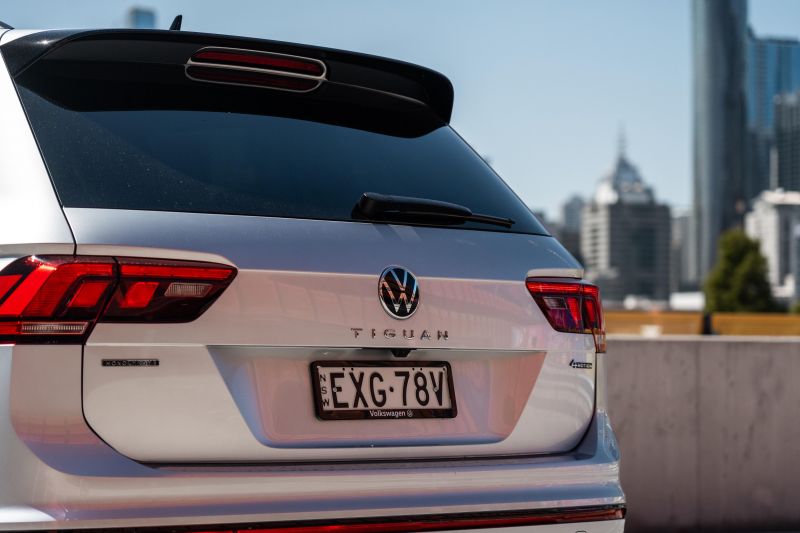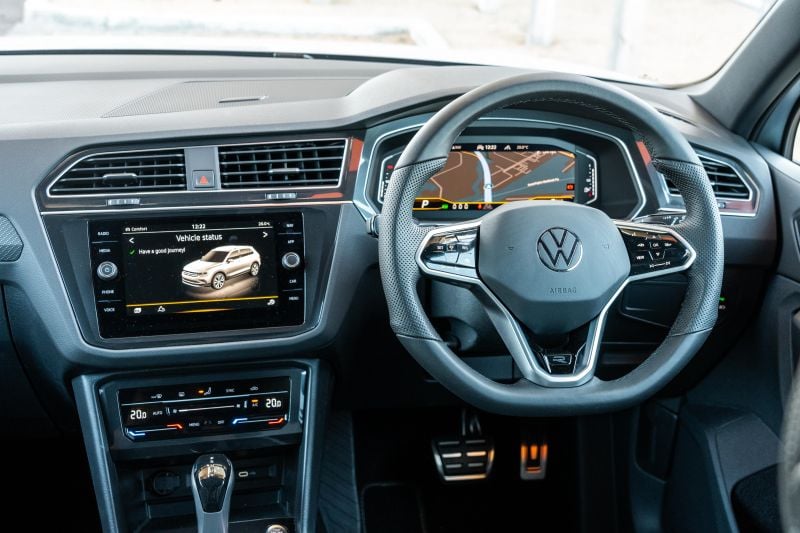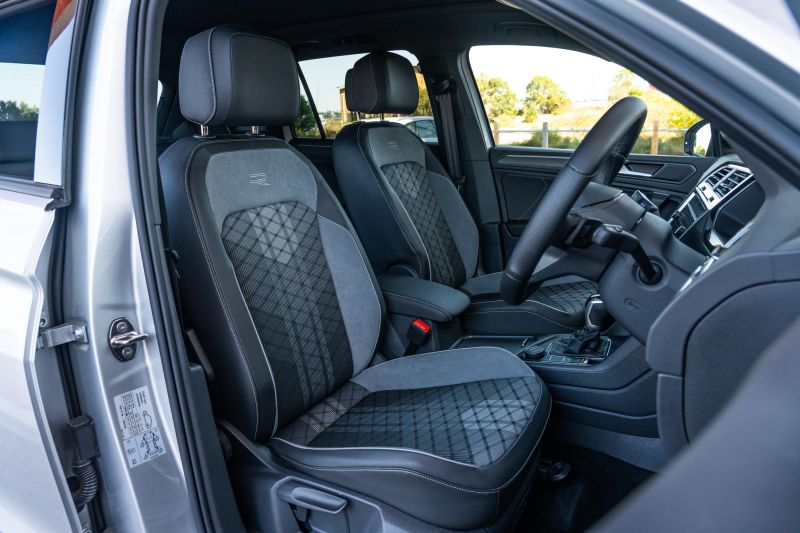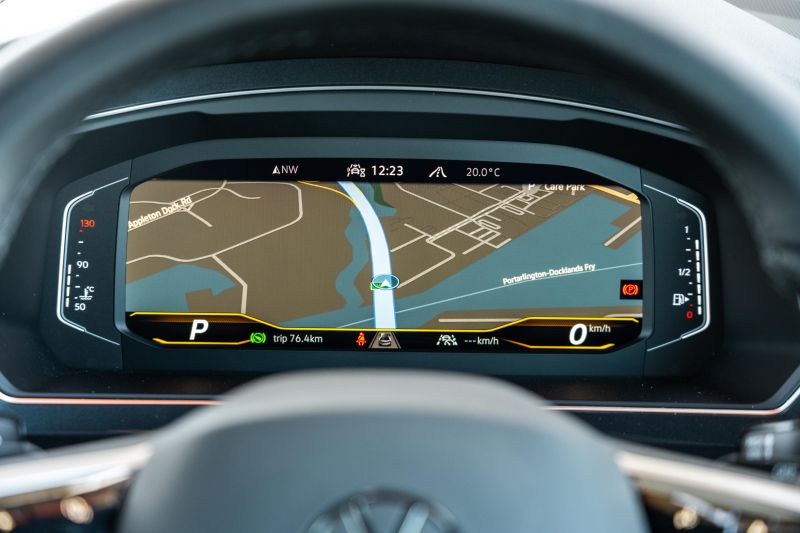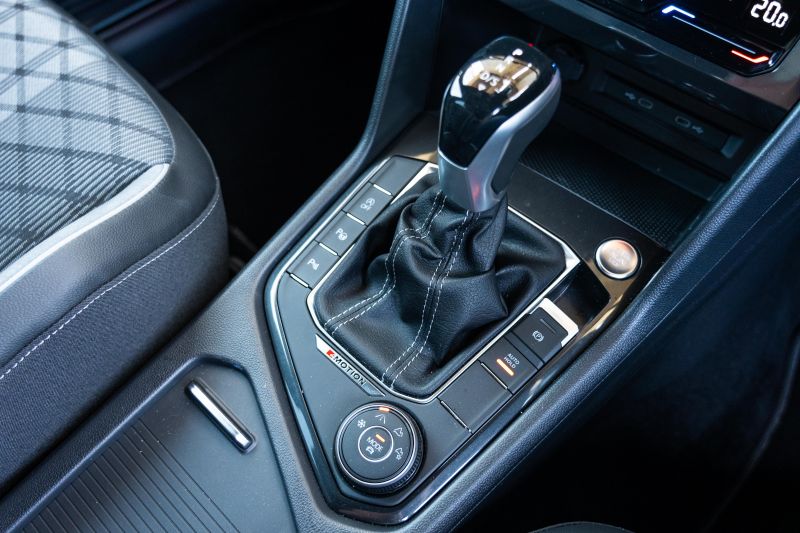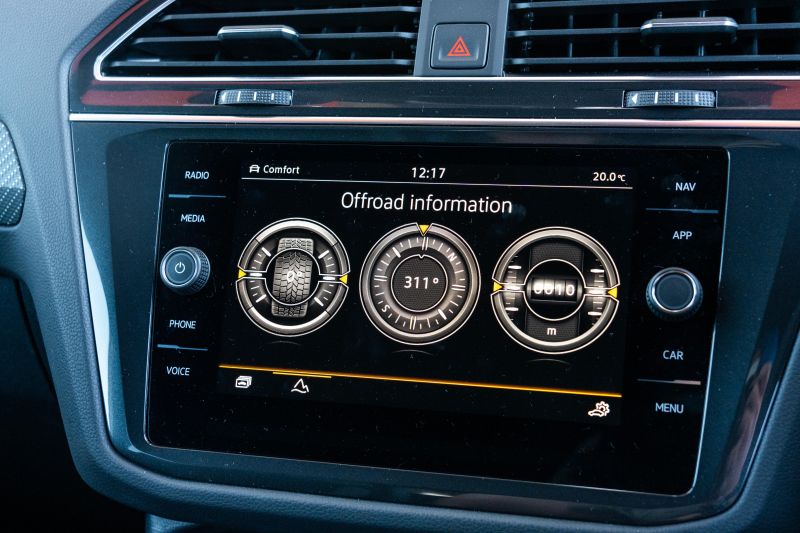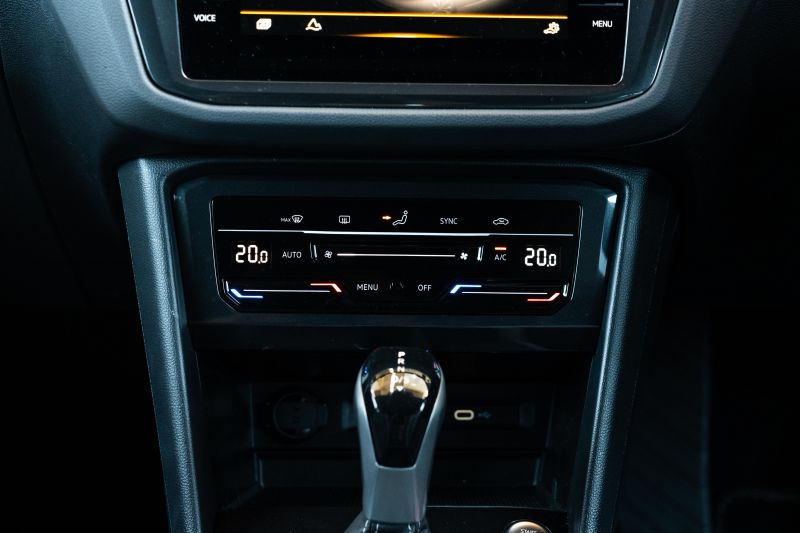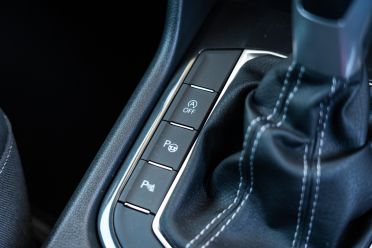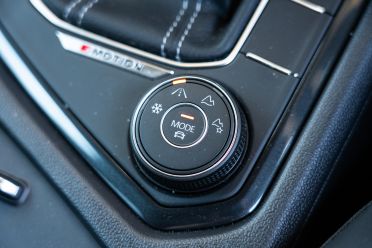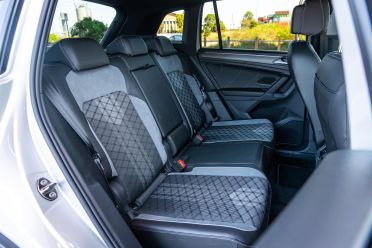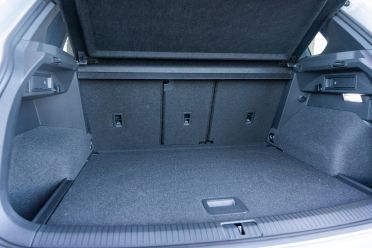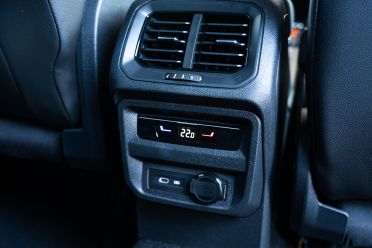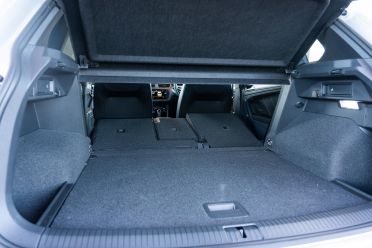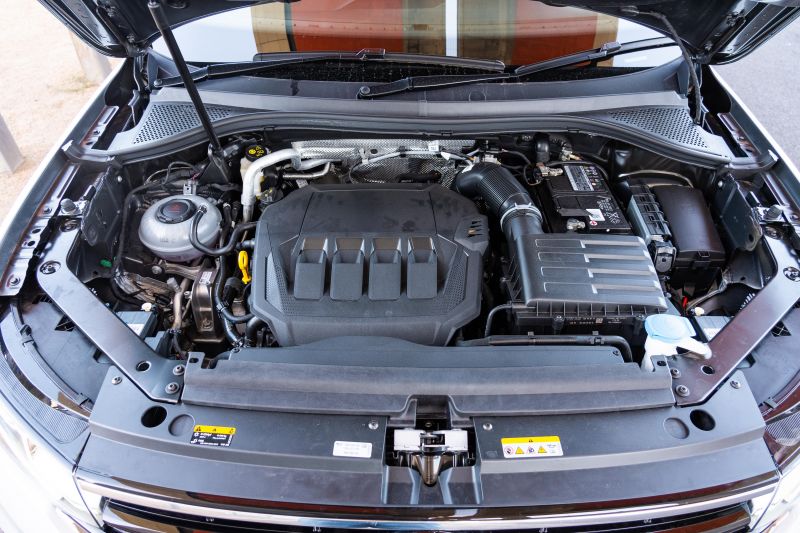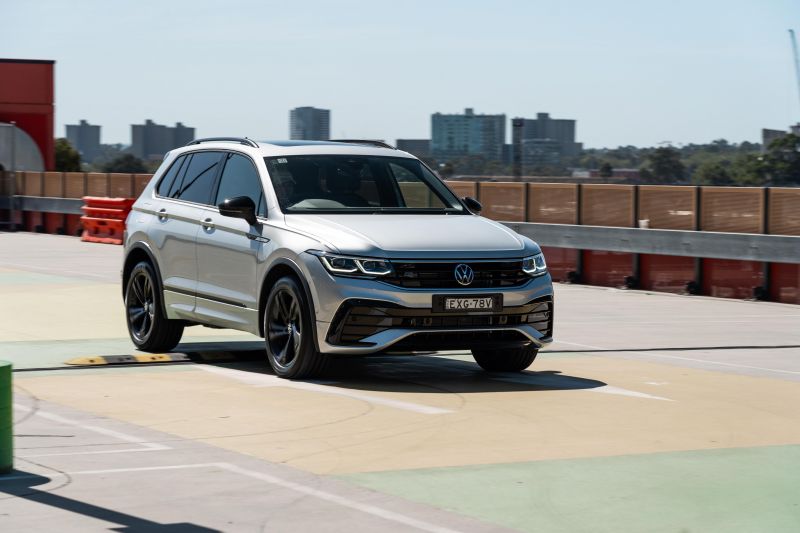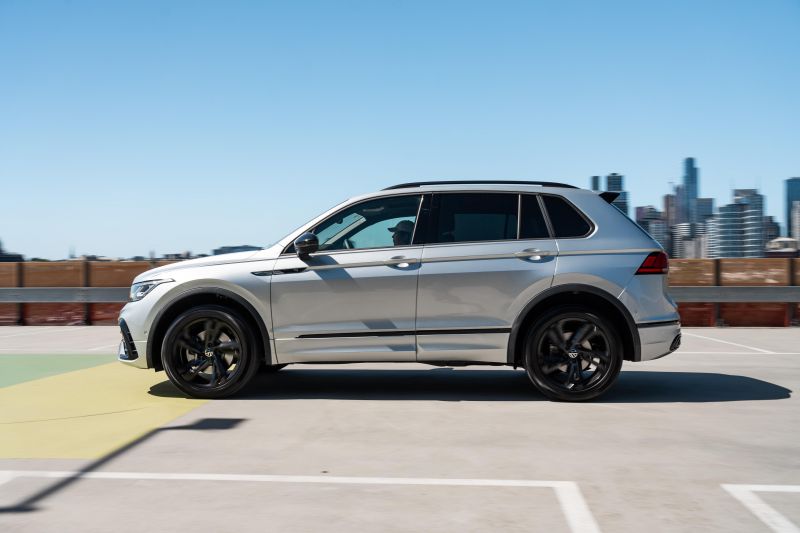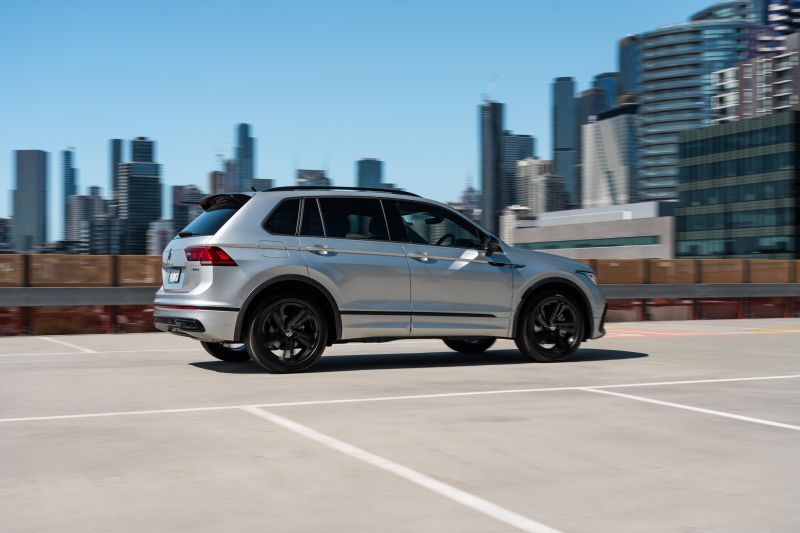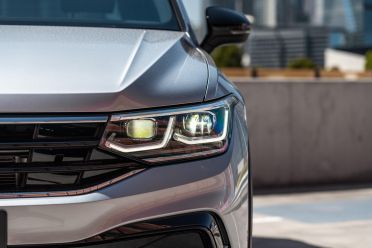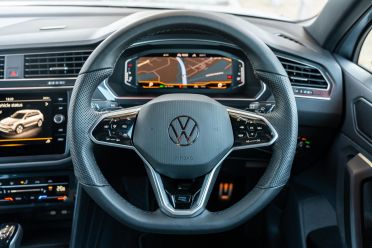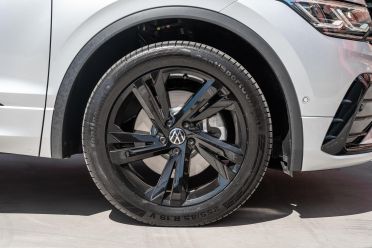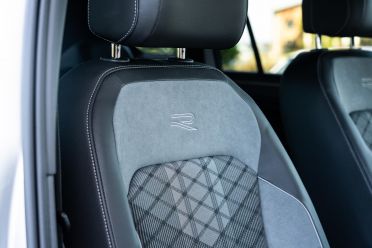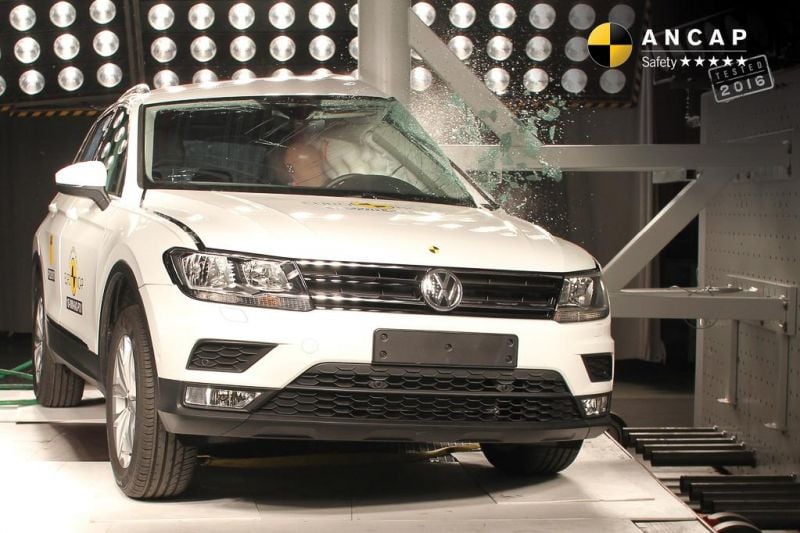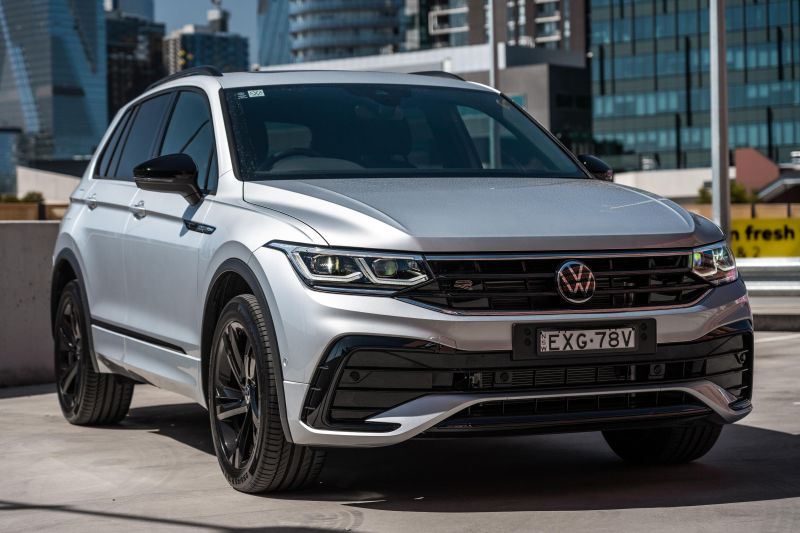The Volkswagen Tiguan is one of the older medium SUV models out there in its current generation (it premiered in 2016) yet it remains one of the best.
Particularly at its higher trim levels, the Tiguan is a well-packaged, handsome and fun-to-drive offering that straddles the line between mainstream and luxury products as all VWs should.
While the longer Tiguan Allspace is more family friendly, the regular five-seat body style we have here looks better. It’s edgy sheetmetal has aged well and the big wheels give it a great stance.
It might appear that the Tiguan 162TSI Monochrome special edition reviewed here is a marketing-led offering to revive interest. But the only thing holding back the Tiguan of late has been lack of supply.
Think rather of the Tiguan 162TSI Monochrome as a de-contented version of the popular 162TSI R-Line at a slightly lower price point – with potentially shorter wait times due to the removal of a few chip-heavy features.

How much does the Volkswagen Tiguan 162TSI Monochrome cost?
The Tiguan 162TSI Monochrome costs $53,390 before on-road costs, which is $5300 less than the better-equipped 162TSI R-Line with metallic paint (standard on the Monochrome).
If you need more space, the Tiguan Allspace Monochrome seven-seater (reviewed here) with the same 162TSI drivetrain costs $55,690.
The medium SUV segment is the most hard-fought corner of the market, with top-shelf competitors including:
- Hyundai Tucson Highlander AWD: $50,900
- Kia Sportage GT-Line AWD: $49,720
- Mazda CX-5 Akera 2.5T AWD: $54,000
- Nissan X-Trail Ti-L AWD: $52,990
- Toyota RAV4 Edge AWD: $54,520
Prices exclude on-road costs
What is the Volkswagen Tiguan 162TSI Monochrome like on the inside?
The Tiguan has proximity key access, meaning you just approach with the fob in your pocket and the door unlocks, and the side mirrors unfold. In classic VW form the doors close with the heft of bank vaults.
While the seats are technically a downgrade on the regular 162TSI R-Line’s leather pews, I see few issues with suede, cloth and leatherette. They look great and offer good levels of support and bolstering, though note they adjust manually rather than with powered assistance.
Some ‘racy’ touches include carbon-fibre-lookalike trims on the doors and dash, R-Line logos here and there, and metallic pedal caps.
Many surfaces are padded, and the general build quality and finish is absolutely first-rate. This is proper old-school Volkswagen.
The steering wheel looks great and has nicely perforated hand grips, but I find the haptic-feedback touch-sensitive black plastic pieces on the wheel spoke to control audio and safety functions to be needlessly fiddly to use. We aren’t the first to note this.
I’ll grant these wheel controls one positive: you can change the audio volume levels by lightly sliding your left thumb horizontally. Otherwise, just no.
Behind the wheel sits a fully digital instrument cluster with high levels of configurability – more so than the (initially) sharper-looking units in the Tucson/Sportage. For instance, you can view driving maps in full-size, or neatly sandwiched between the instruments.
The centre touchscreen is a downgrade from the Tiguan 162TSI R-line, measuring 8.0-inches rather than 9.2-inches. It’s one part of the interior that does feel a bit dated, although its loading times are decent.
It offers satellite navigation, wireless phone mirroring, nicely designed vehicle status menus, and haptic touchpoint toolbars. It also has a gesture control system whereby a dismissive hand wave near the screen takes you to the next menu. A bit naff, but sort of cool.
The reverse-view camera quality is middling, a smidgen grainy actually, but on the plus side you can make the side mirrors automatically dip for when parallel parking along a raised kerb.
Below the smallish screen sits another glossy black plastic, touch-sensitive control bank for the air-conditioner, which I actually found relatively easy to use. Below this sits a flat rubbery pad for your phone, plus USB-C (x2) and 12V inputs.
There’s a fair degree of storage including bottle holders in the doors, an open section behind the gear shifter with pop-out cupholders, a centre console, glovebox, and a dashtop cubby. Volkswagen continues to trim inside these storage areas with fabric to muffle noise, which is a nice touch.
The optional sunroof removes the nifty rooftop storage bins, but for me that’s a reasonable trade-off.
There’s some additional fine detailing such as the chunky knurled rotary dial to change driving mode, which feels like a Swiss watch, and the raised ‘4Motion’ badge behind the leather-trimmed gear shifter. All the buttons are damped, and satisfying to play with.
While the 4.5-long short-wheelbase Tiguan is quite compact by class standards, its back seats are spacious enough for me (194cm) to sit behind my own driving position with knee-room and foot-room to spare. Headroom was plentiful even with the sunroof.
The trims on the doors are decent quality, and there are various stowage bins, seatback pockets, coat hooks and a flip-down armrest with cupholders. The back seats are a little flat in the base but offer adjustable backrests and headrests.
Other amenities back there include LED reading lights, a USB-C port and a 12V outlet, plus rear vents with their own temperature zone. There are also three top-tether and two ISOFIX points, but we’d like the doors to open a little wider for loading kids aboard.
The boot is accessed by a manual-only tailgate (another example of de-specification) and is rated to store 615 litres with the back seats in place (which fold in three sections 40:20:40) in use, and has a floor length of 977mm.
Fold the second-row down via levers in the boot and you have 1746mm of floor and 1655L capacity. There are also bag hooks and solid tie-down points. Lift the boot floor and you find the now-common space-saver spare wheel – better than a repair kit at least.
Take note that the Tiguan Allspace adds a folding third-row of seating and offers a 700L boot with two rows in use.
What’s under the bonnet?
Power comes from the familiar 2.0-litre turbocharged four-cylinder petrol engine used in other Tiguan 162TSI variants (and the previous-generation Golf GTI).
While not as potent as the hardcore Tiguan R, the Tiguan 162TSI still offers a very respectable 162kW (4200-6000rpm) and 350Nm (1500-4000rpm), among the most powerful medium SUVs at its price.
From the list of competitors above, only the Mazda CX-5 Akera with 170kW and 420Nm from its 2.5-litre turbo outguns the Tiguan. The Hyundai and Kia’s top-performing engines are diesel, though both offer a 1.6-litre turbo-petrol as well.
The Volkswagen’s engine is mated to a full-time 4Motion all-wheel drive system with torque-on-demand and a seven-speed DSG transmission.
That’s sufficient for a zero to 100km/h time of about 7.0 seconds, which is hot-hatch levels of quick. Claimed fuel efficiency is 8.5L/100km and it requires expensive premium unleaded (95 RON).
Volkswagen advises a braked-trailer towing capacity of 2500kg with a 200kg towball download ceiling.
How does the Volkswagen Tiguan 162TSI Monochrome drive?
The Tiguan drives in a fashion that many compact SUV do not. It’s fun.
The engine is fantastic, with a heap of torque from right down low giving strong rolling response, and a slick-shifting dual-clutch transmission.
There are myriad driving modes to cycle through, with the sportiest setting holding lower gears for longer to maximise response, and there are paddles if you fancy a self-shifting stint.
The AWD system means no axle-tramping on hard acceleration, with variable torque split adding reassurance on slippery surfaces. The Continental tyres are high quality too.
The various modes adjust things like engine and transmission response, and even ride quality.
The Tiguan belies its body-style with distinctly car-like handling, offering excellent body control – little in the way of listing or rolling in corners – and nice responsive steering.
It also settles well after undulations and offers excellent levels of ride comfort over patchy roads, even with the adaptive chassis control’s dampers set to their sporty setting.
It behaves like an elevated hot hatch.
The independent suspension comprises MacPherson struts at the front and four-linkages at the rear plus electronically adjustable damping. The turning circle is listed as 11.9 metres and the running ground clearance 185mm.
Off the beaten path, this is clearly no low-range-toting bush-basher, but it does have dedicated soft-road modes that tweak vehicle behaviour across multiple slippery surface types and a touchscreen menu with key information such as pitch and roll angles.
The Tiguan’s driver-assist features, namely adaptive cruise control and the semi-autonomous lane-keeping aid, worked flawlessly on highways, but I dislike the steering wheel controls to activate them.
For example the black plastic piece with haptic feedback requires a gentle tap to increase speed increments, and a firmer press to increase the speed target by 10km/h, but I clearly lack the requisite gentle touch to work it reliably!
What do you get?
The 162TSI Monochrome is a de-specced 162TSI R-Line, losing standard features such as the latter’s 9.2-inch touchscreen (8.0-inch instead), powered tailgate, powered leather seats (ArtVelour/cloth), heated seats and steering wheel.
“The Monochrome… allows us to tailor packages that avoid lengthy wait times caused by semiconductor shortages, in a valuable special edition format for customers,” says brand director Michal Szeniecki.
Outside
- Gloss black 19-inch wheels
- Space-saver spare wheel
- LED Performance headlights
- Dynamic front indicators
- LED daytime running lights
- LED tail lights
- Adaptive chassis control
- Roof rails
- Proximity key
- Front, rear parking sensors
- Folding and auto-dipping side mirrors
- Manual tailgate
- Rain-sensing windscreen wipers
- Metallic or pearlescent paint
- Dark-tinted window glass (90 per cent)
- R-Line bumper design and badge
- Black trims accents:
- Window frame
- Lower body moulding
- Grille highlights
- Lower intake and bumper
- Mirror caps
- Rear spoiler
- Exhaust tips
Inside
- Tri-zone climate control
- Dust and pollen filter
- ArtVelour/Cloth R-Line seat trim
- Manual seat adjustment
- Floor mats
- Carbon grey and matte chrome inlays
- Black headlining and pillar trims
- Reversing camera
- 8.0-inch touchscreen with gesture control
- Satellite navigation
- AM/FM/DAB radio
- Apple CarPlay – USB-C and wireless
- Android Auto – USB-C and wireless
- 8-speaker audio
- 10.25-inch digital instrument display
Options
- Oryx White Pearlescent paint: $900
- Panoramic sunroof: $2100
Is the Volkswagen Tiguan 162TSI Monochrome safe?
Safety tester ANCAP awarded the Tiguan a five-star rating in 2016, but this rating has now lapsed as of December 2022.
The vehicle is now unrated, and the new-generation model is not far away.
Standard safety equipment includes:
- 7 airbags incl. driver’s knee
- Autonomous emergency braking (AEB)
- Low-speed, high-speed
- Pedestrian, Cyclist detection
- Adaptive cruise control
- Travel Assist (adaptive cruise + lane centring)
- Blind-spot assist*
- Rear cross-traffic alert*
- Driver fatigue monitoring
- Lane-keep assist
- Parking sensors front, rear
- Emergency Assist (pulls vehicle over if driver is unresponsive)
- Proactive Occupant Protection*
*Currently unavailable for MY23 due to semiconductior-related shortages
How much does the Volkswagen Tiguan 162TSI Monochrome cost to run?
Volkswagen Australia provides a five-year, unlimited kilometre warranty, and one year of complimentary roadside assist.
Service intervals are every 12 months or 15,000km, and you can buy a care plan covering the first five services for $3200 – average cost $640 a visit, which is on the high side but cheaper than paying as you go.
CarExpert’s Take on the Volkswagen Tiguan 162TSI Monochrome
It’s not the newest design out there, but the Tiguan remains a fundamentally outstanding product, particularly with the 162TSI drivetrain.
That’s why this Monochrome model, which does without some mod-cons in return for a price cut, is so appealing. It looks sharp, drives beautifully, is made with an eye on quality, and despite being compact is highly capacious inside.
It’s not the cheapest car to service (although VW’s Care Plans make it cheaper to maintain than older models), and it misses out on some driver-assist aids and the latest-iteration touchscreen, but by and large it’s still an absolute winner.
That’s pretty impressive considering Volkswagen is almost ready to reveal the all-new model.
Click the images for the full gallery





